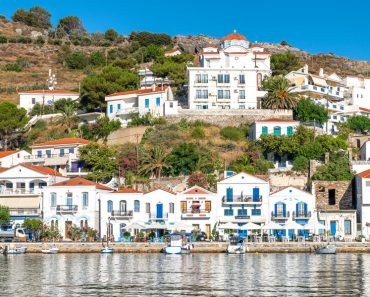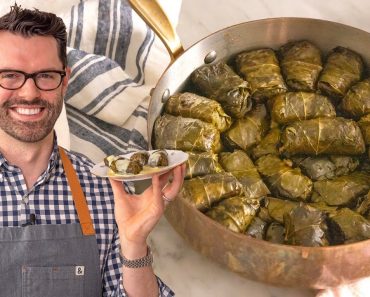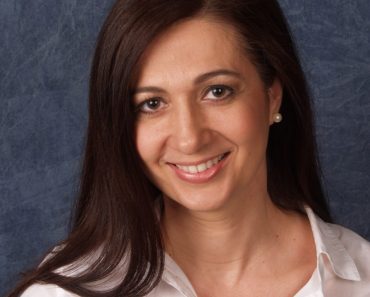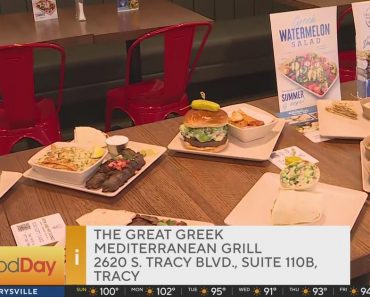
Displaced from his native Kyrenia at the age of 24, during the Turkish invasion of Cyprus on July 20, 1974, Christos Haritonides built his own business empire across seven countries before eventually relocating to his home country – where he hopes the reunification of the island under a federal state solution is still feasible.
The so-called Cyprus problem has been lingering over the island of Aphrodite to this very date, and yet it is a topic rarely touched upon by international media, despite the touristic popularity of the easternmost country of Europe.
Christos Haritonides is one of many Cypriot refugees who, bereft of their assets seized by the Turkish troops, had turned to the business economy to survive. Now with the confidence acquired as a citizen of the world and a self-made prominent businessman, he tells Greek Reporter of the reality of Cyprus then and now, and how the traumatic experience of his people became a motivation and a propeller for success for his compatriots who vowed they wouldn’t give up on the blessings they lost.
Forced to move on after losing a homeland and a secure future
Fifty one years have passed from the day that a newlywed electrical engineer graduate Christos Haritonides, son of a wealthy real estate businessman, saw the fleet of Turkish warships from his beachfront villa on Lapithos. Rumors had been circulating for a while, he recalls, and now their fear was becoming reality.
“These events were all a setup. I don’t blame anyone, but I believe the invasion was pre-meditated. And they uprooted us, leaving us with no place to go,” he says.
He and his British wife of four months, whom he had met during their studies in London, left their home in a rush to save their lives, taking nothing with them. Upon reaching the “free regions,” a name used for today’s Greek-Cypriot part of the island, Christos joined the Cyprus army for a few days until the couple was evacuated to the UK by the RAF. The lands and wealth that his family had owned were now in the hands of the invaders.

“We left the island with absolutely no money, not even to buy food, penniless” he recalls.
The couple worked hard for a year in any job they could find, even though they were both university graduates. They saved money for a new beginning elsewhere, as Christos didn’t want to live in a country which he knew had had its part in the loss of his homeland. So they decided to start over in Canada.
There, Christos partnered with other Greek-Cypriot refugees and together they launched a Greek restaurant in 1977 under the name Greek Connection, which was destined to be his debut business venture.
Uprooted Cypriot conquering international business
Encouraged by the success of the co-owned restaurant in Canada, Christos launched his very own Greek Connection in Los Angeles in 1984 which became an instant success and bloomed into a true Hollywood stars’ hangout that even became the topic for a documentary by Australia’s Channel 9.
“This restaurant was a landmark and point of reference for the entire industry; musicians, actors, producers, directors, stylists,“ Christos describes with pride.
World-famous Greeks like Telly Savvalas, James Galanos, John Stamos, became frequent patrons, and so did American stars like Tom Cruise with his then-wife Nicole Kidman, Eddie Murphy, Angie Dickinson, and Shirley McLane.

“Greek-Australian film star Costas Mandylor was not only among our patrons, but had also worked at the restaurant before rising to fame, like many Hollywood stars did in those days. We are friends now and still keep in touch,” he entrusts.
Additionally, Hollywood films and series, such as Beverly Hills Cop and NYPD Blue, had scenes shot in Greek Connection Los Angeles, and Christos even made an on-screen appearance.

Nonetheless, the ingenious young Cypriot businessman did not rest on his laurels. In the meantime, he invested profits in the launch of more restaurants on the famous Restaurant Road, as well as on other types of business; international trade companies, medical clinics and real estate properties in Los Angeles, plus a construction project in Greece, thus creating an enviable business portfolio.
While the business acumen of Cypriots is legendary, Christos attributes this quality to any people that has suffered challenges similar to his.
“I believe that great businessmen come from challenged countries, like Cyprus, Lebanon, Israel. My personal motivation was that I didn’t want to quit. At the time of the Turkish invasion of Cyprus, I was on top of the world, set for a new and happy life. And when I lost everything, I became determined to recreate all of it.”
The return to Cyprus and an old vision made reality
After selling Greek Connection Los Angeles in the late 90s, Christos moved to Dubai, where he pioneered misting cooling systems as a representative under invitation by a Sheikh.
Meanwhile, the Greek Connection brand was re-homed in Medellin, Colombia, until the Covid-19 pandemic, and Christos eventually relocated to Cyprus in recent years to materialize an old vision he had shared with his late father; the creation of a hotel unit.
“I love hospitality altogether, not just catering; hospitality is my strength,” he argues.

While the Turkish invasion had prevented him from building his dream business at the time and in the way that his young self had planned – on his favorite beach, from where he saw the warships coming in 1974 – Christos eventually brought to life his new brand, La Hacienda boutique hotel apartments, in Limassol as well as in Medellin.
“I now live in Cyprus for the most part. I have lived in extreme weather climates, from Canada to Dubai. The climate here is just perfect. Official statistics show that Limassol is the sunniest city in Europe, while Cyprus has the beaches with the cleanest waters. Where else should I go,” he adds with a smile.

While some owners of seized real estate properties in the occupied areas have resorted to the European Court of Justice in recent years to claim the right to sell them before a resolution is reached for the Cyprus problem, Christos hasn’t considered taking similar action.
“We wait,” is his only comment.
Hopes of sustainable solution after half a century under Turkish occupation
A large number of displaced Greek-Cypriots never saw their lost homelands and estates after 1974. The eldest died in waiting to be allowed to go back, and some of the younger to have left, refuse to cross the border into the occupied part of the island ever since 2008, when they became allowed to, considering such a move as legitimizing to the de facto state of Northern Cyprus.
Before 2008, citizens with passports of the official Republic of Cyprus were forbidden to enter the occupied areas altogether, however Christos had used his Canadian passport in 1979 to return to Lapithos and see his lost home, while he continues to visit his native region often. But when he is asked whether a sustainable solution to the Cyprus problem is still feasible after the north part of the island has been under Turkish occupation for over half a century, he mumbles an awkward “I don’t know.”
“Fifty years now, mistakes have been made by governments over old mistakes and more mistakes. I believe that the current President of the Republic of Cyprus, Nikos Christodoulides, is on the right track. However, there needs to be compromise from both sides to move forward.”
In his opinion, the reunification of the island as a federal state where the Greek-Cypriot and Turkish-Cypriot communities will live harmoniously with equal rights as European citizens and under common nationality, defined simply as Cypriots, is the only way out of this impasse situation.
His heart and mind haven’t forgotten how they once lived in union with their Turkish-Cypriot neighbors in Lapithos, often having them for coffee. In his most recent visit to the occupied areas, he was warmly welcomed by a Turkish-Cypriot who was himself displaced from Paphos during the exchange of populations that followed the invasion. Christos feels that, with proper education, the new generations will be able to get over the traumas and atrocities of the past.
“Still today, whenever I meet Turkish-Cypriots abroad, I see them as brothers. If it wasn’t for the intervention of third countries that triggered the events –whichever those countries may be- for their own interests, we would be still living like this,” he states.
He is aware that Turkish-Cypriots themselves feel oppressed by the Turkish rule. The Turkish-Cypriot community has demonstrated against Turkey’s policies on Cyprus in 2011, and most recently in May 2025.
“If the external Great Powers leave us alone, I am sure the two communities will find again the way to peacefully co-exist,” he concludes, as he hangs up from our call to pass the crossing point in Nicosia, towards his beloved Lapithos, once more.







